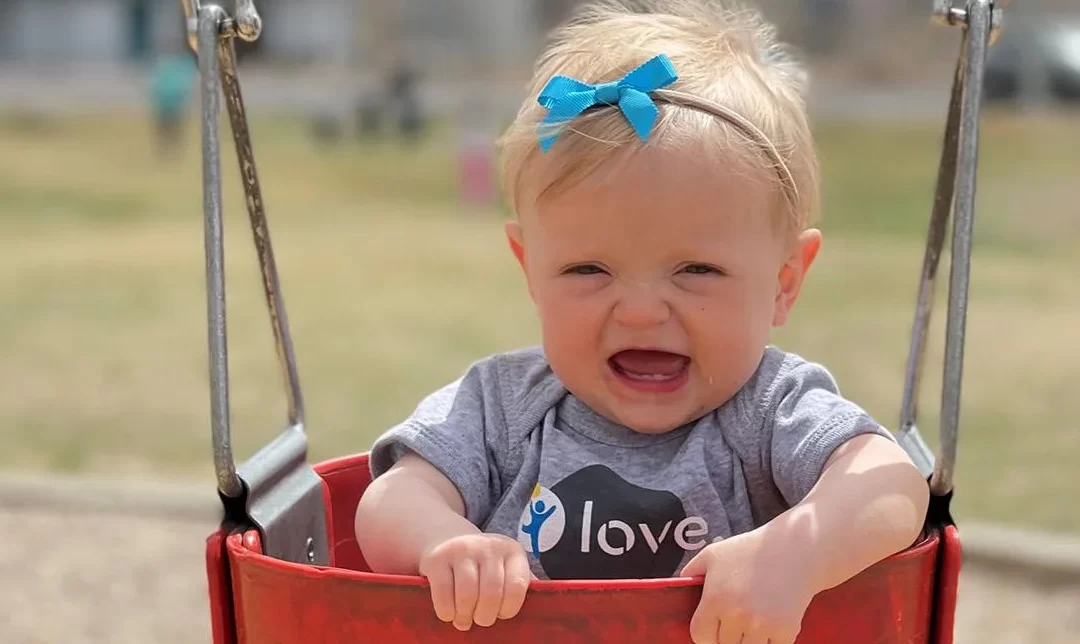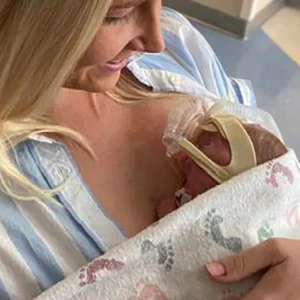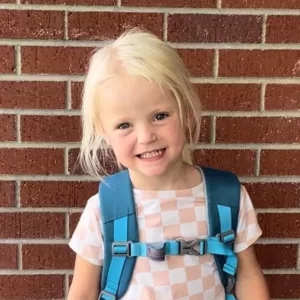Rural Colorado couple Lyndsy and her husband, Aaron, found out they were expecting their third child, Ella, in November of 2019. Right when COVID-19 shut down the country in March of 2020, doctors discovered a large mass on Ella’s tailbone during Lyndsy’s 20-week ultrasound. Within days and with the tumor already rapidly growing, Lyndsy and Aaron had a telehealth visit with a maternal fetal medicine specialist at the Colorado Fetal Care Center who confirmed Ella had a sacrococcygeal teratoma, or SCT — an extremely rare fetal tumor that occurs in only 1 in every 40,000 live births. The Colorado Fetal Care Center was the only facility in the region to offer the procedure that ultimately saved Ella’s life.
When Lyndsy was 22 weeks, they traveled from their hometown in Montrose, Colorado to Children’s Hospital Colorado for the day for a comprehensive appointment at the Colorado Fetal Care Center. This included a fetal MRI, fetal ultrasound, fetal diagnostic testing and a fetal echocardiogram. Doctors on the team, including maternal-fetal medicine specialist Michael Zaretsky, MD, helped the family understand their treatment options, such as fetal surgery, and the potential risk and outcomes involved.
“It was a lot of information to take in, and it was hard to hear,” Lyndsy says. “I had tons of questions over the next few weeks. But every time I’d call Dr. Zaretsky or any of the fetal care team, they’d call me back that same day. That really helped me and my husband through the process so we could make a decision that was right for us.”
At 24 weeks, Ella’s mass was nearly as big as she was. Additionally, the tumor required a significant amount of blood and placed additional strain on her rapidly beating heart. Lyndsy and her care team decided it was time to move to Denver so that if there were any problems or she went into labor, she’d be closer to the hospital. Monitoring Ella effectively would require Lyndsy to visit the hospital two to three times a week.
Offering a rare procedure
By 27 weeks, Lyndsy was so swollen with amniotic fluid and the size of Ella’s tumor was so large that Lyndsy’s doctors decided to schedule her for an ex utero intrapartum treatment procedure, or EXIT procedure. This is a highly specialized surgical procedure used to deliver babies who will be unable to breathe or transition safely from fetal life when separated from their mother.
The Colorado Fetal Care Center is the only facility in the Rocky Mountain region to offer EXIT procedures. This is because it’s a complex procedure, requiring a coordinated effort from both maternal and pediatric providers from multiple specialties including maternal anesthesia, fetal anesthesia, maternal fetal medicine, fetal surgery and fetal cardiology.
In Ella’s case, the EXIT procedure would allow doctors to partially remove her from the uterus while keeping her connected to the placenta. This would allow doctors to remove Ella’s tumor before she took her first breath, giving her the best chance for survival.
Providing hope for the future
At the end of April 2020, one of their fetal and pediatric surgeons performed the EXIT procedure with an extensive multidisciplinary team of more than 20 fetal specialists to ensure that Ella and Lyndsy received the best care possible. Ultimately, the SCT was about double Ella’s size — one of the largest the team had ever seen. Once it was successfully removed, they fully delivered Ella. She needed resuscitation from neonatology specialists. Her heart wasn’t emptying blood. Her lungs weren’t filling with air. At one point, it was unlikely she would live, but the team continued to fight.
Against all odds, Ella stabilized. It was nothing short of incredible, the care team says. And eventually, Ella was moved down the hall to recover in the Level IV neonatal intensive care unit (NICU) just steps away from where Lyndsy was recovering in the labor and delivery unit.
“The whole team was really good about updating us,” Lyndsy recalls. “They even pushed me over in my hospital bed so that I got to see Ella in her private room. At first the updates were, ‘Your baby is very sick, and she isn’t doing well.’ But then over time that changed to, ‘She’s moving and doing well and looking good.’ And I think that really says something about the quality of care she was getting.”
After her long fight in the NICU, Ella continued to thrive. Now four years later, she loves to play with her older siblings and explore the outdoors. She recently took on the new role of big sister and chief mess-making officer — her parents joke no shelf or drawer is empty enough for Ella. Looking back, Lyndsy says she’s incredibly grateful for everyone at the Colorado Fetal Care Center, who she now considers family, and the comprehensive care they provided.
For more information about the Colorado Fetal Care Center, please visit childrenscolorado.org/Fetal-Care.



